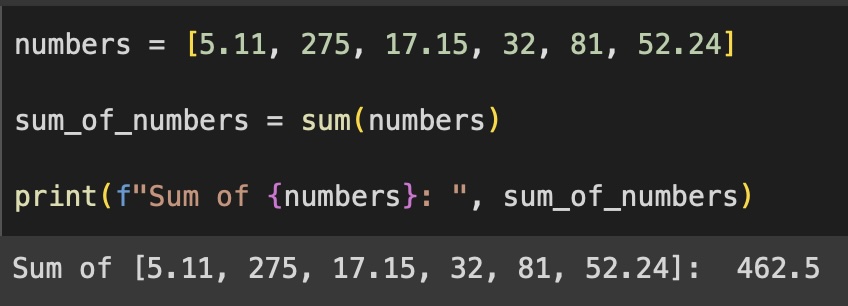We can make use of the the built-in sum() function. Let's take a look at a few examples.
Example 1: Calculate the sum of a list of integers
int_numbers = [11, 5, 2, 17, 32, 81, 52]
sum_of_int_list = sum(int_numbers)
print(f"Sum of {int_numbers}: ", sum_of_int_list)Sum of [11, 5, 2, 17, 32, 81, 52]: 200Example 2: Calculate the sum of a list of floats
float_numbers = [11.2, 5.11, 2.75, 17.56, 32.43, 81.45, 52.24]
sum_of_float_list = sum(float_numbers)
print(f"Sum of {float_numbers}: ", sum_of_float_list)Sum of [11.2, 5.11, 2.75, 17.56, 32.43, 81.45, 52.24]: 202.74Example 3: Sum of random numbers

Facing issues? Have Questions? Post them here! I am happy to answer!
Author Info:
Rakesh (He/Him) has over 14+ years of experience in Web and Application development. He is the author of insightful How-To articles for Code2care.
Follow him on: X
You can also reach out to him via e-mail: rakesh@code2care.org
More Posts related to Python,
- How to convert int to ASCII in Python
- How to make use of SQLite Module in Python?
- Split a String into Sub-string and Parse in Python
- Python: Pandas Rename Columns with List Example
- How to run Python file from Mac Terminal
- How to Exit a Loop in Python Code
- Python: How to Plot a Histogram using Matplotlib and data as list
- MD5 Hashing in Python
- Jupyter: Safari Cant Connect to the Server localhost:8888/tree
- Fix: AttributeError: str object has no attribute decode. Did you mean: encode?[Python]
- How to Read a binary File with Python
- How to add two float numbers in Python
- Python: How to install YAML Package
- Python: How to Save Image from URL
- What is Markdown in Jupyter Notebook with Examples
- How to change the Python Default version
- 33: Python Program to send an email vid GMail
- How to comment code in Python
- How to Fix AttributeError in Python
- Fix: error: Jupyter command `jupyter-nbconvert` not found [VSCode]
- How to comment out a block of code in Python
- List of All 35 Reserved Keywords in Python Programming Language 3.11
- Import Other Python Files Examples
- Python: How to add Progress Bar in Console with Examples
- 3 Ways to convert bytes to String in Python
More Posts:
- Fix: Uncaught ReferenceError: exit is not defined - Node.js REPL - JavaScript
- How to Unlock Jenkins on Localhost 8080 on Mac - MacOS
- Sort ls command by last modified date and time - Linux
- ModuleNotFoundError: No module named qdarkstyle.colorsystem [Python] - Python
- How to Zip a File or a Folder using Default Compression Option - Windows-11
- Safari Full Screen Shortcut using Keyboard [macOS] - MacOS
- Fix: java: void cannot be dereferenced - Java
- Turn off Startup Sound on Mac running on macOS Ventura - MacOS